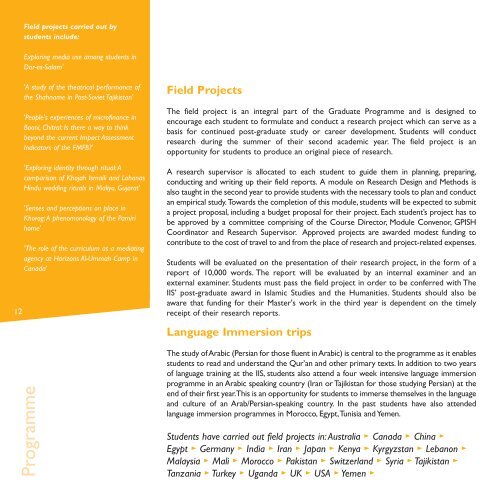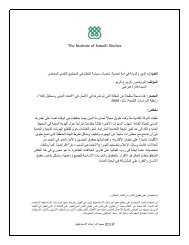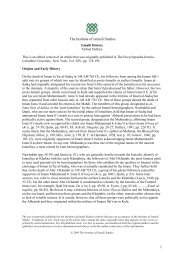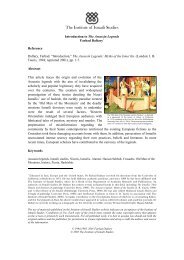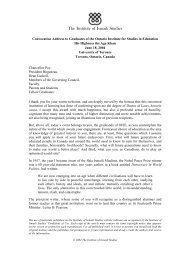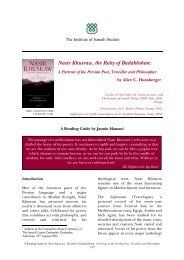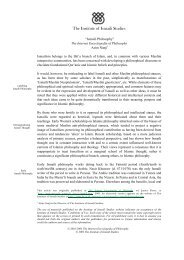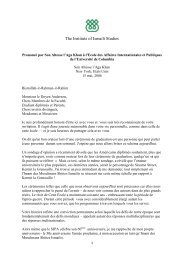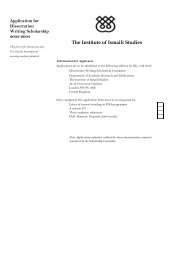GPISH prospectus 2012-16_Layout 1.qxd - The Institute of Ismaili ...
GPISH prospectus 2012-16_Layout 1.qxd - The Institute of Ismaili ...
GPISH prospectus 2012-16_Layout 1.qxd - The Institute of Ismaili ...
You also want an ePaper? Increase the reach of your titles
YUMPU automatically turns print PDFs into web optimized ePapers that Google loves.
Field projects carried out by<br />
students include:<br />
Exploring media use among students in<br />
Dar-es-Salam'<br />
12<br />
'A study <strong>of</strong> the theatrical performance <strong>of</strong><br />
the Shahname in Post-Soviet Tajikistan'<br />
'People's experiences <strong>of</strong> micr<strong>of</strong>inance in<br />
Booni, Chitral: Is there a way to think<br />
beyond the current Impact Assessment<br />
Indicators <strong>of</strong> the FMFB?'<br />
'Exploring identity through ritual: A<br />
comparison <strong>of</strong> Khojah <strong>Ismaili</strong> and Lohanas<br />
Hindu wedding rituals in Maliya, Gujarat'<br />
'Senses and perceptions on place in<br />
Khorog: A phenomonology <strong>of</strong> the Pamiri<br />
home'<br />
'<strong>The</strong> role <strong>of</strong> the curriculum as a mediating<br />
agency at Horizons Al-Ummah Camp in<br />
Canada'<br />
Programme<br />
Field Projects<br />
<strong>The</strong> field project is an integral part <strong>of</strong> the Graduate Programme and is designed to<br />
encourage each student to formulate and conduct a research project which can serve as a<br />
basis for continued post-graduate study or career development. Students will conduct<br />
research during the summer <strong>of</strong> their second academic year. <strong>The</strong> field project is an<br />
opportunity for students to produce an original piece <strong>of</strong> research.<br />
A research supervisor is allocated to each student to guide them in planning, preparing,<br />
conducting and writing up their field reports. A module on Research Design and Methods is<br />
also taught in the second year to provide students with the necessary tools to plan and conduct<br />
an empirical study.Towards the completion <strong>of</strong> this module, students will be expected to submit<br />
a project proposal, including a budget proposal for their project. Each student’s project has to<br />
be approved by a committee comprising <strong>of</strong> the Course Director, Module Convenor, <strong>GPISH</strong><br />
Coordinator and Research Supervisor. Approved projects are awarded modest funding to<br />
contribute to the cost <strong>of</strong> travel to and from the place <strong>of</strong> research and project-related expenses.<br />
Students will be evaluated on the presentation <strong>of</strong> their research project, in the form <strong>of</strong> a<br />
report <strong>of</strong> 10,000 words. <strong>The</strong> report will be evaluated by an internal examiner and an<br />
external examiner. Students must pass the field project in order to be conferred with <strong>The</strong><br />
IIS’ post-graduate award in Islamic Studies and the Humanities. Students should also be<br />
aware that funding for their Master's work in the third year is dependent on the timely<br />
receipt <strong>of</strong> their research reports.<br />
Language Immersion trips<br />
<strong>The</strong> study <strong>of</strong> Arabic (Persian for those fluent in Arabic) is central to the programme as it enables<br />
students to read and understand the Qur’an and other primary texts. In addition to two years<br />
<strong>of</strong> language training at the IIS, students also attend a four week intensive language immersion<br />
programme in an Arabic speaking country (Iran or Tajikistan for those studying Persian) at the<br />
end <strong>of</strong> their first year. This is an opportunity for students to immerse themselves in the language<br />
and culture <strong>of</strong> an Arab/Persian-speaking country. In the past students have also attended<br />
language immersion programmes in Morocco, Egypt, Tunisia and Yemen.<br />
Students have carried out field projects in: Australia ► Canada ► China ►<br />
Egypt ► Germany ► India ► Iran ► Japan ► Kenya ► Kyrgyzstan ► Lebanon ►<br />
Malaysia ► Mali ► Morocco ► Pakistan ► Switzerland ► Syria ► Tajikistan ►<br />
Tanzania ► Turkey ► Uganda ► UK ► USA ► Yemen ►


